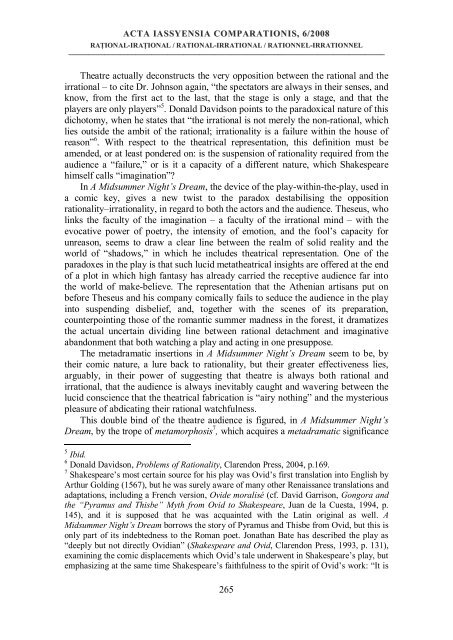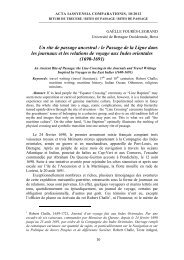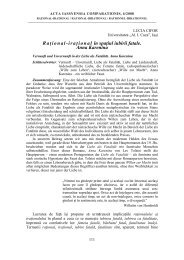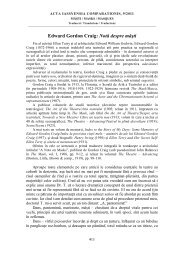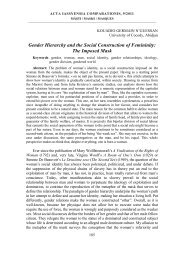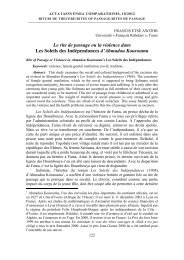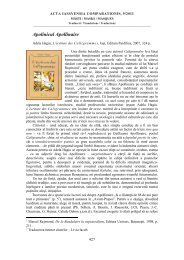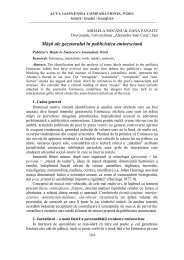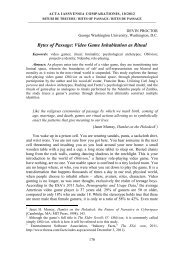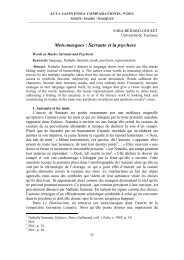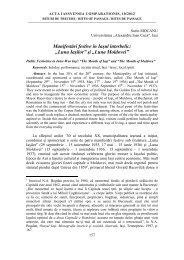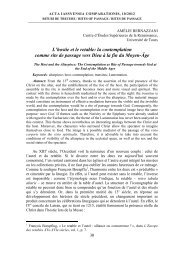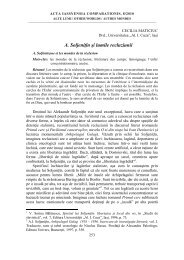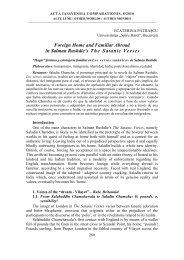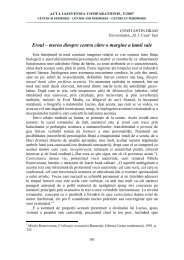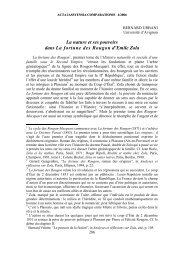Metamorphosis and Metadrama in A Midsummer Night's Dream
Metamorphosis and Metadrama in A Midsummer Night's Dream
Metamorphosis and Metadrama in A Midsummer Night's Dream
You also want an ePaper? Increase the reach of your titles
YUMPU automatically turns print PDFs into web optimized ePapers that Google loves.
ACTA IASSYENSIA COMPARATIONIS, 6/2008<br />
RAŢIONAL-IRAŢIONAL / RATIONAL-IRRATIONAL / RATIONNEL-IRRATIONNEL<br />
________________________________________________________________________________<br />
Theatre actually deconstructs the very opposition between the rational <strong>and</strong> the<br />
irrational – to cite Dr. Johnson aga<strong>in</strong>, “the spectators are always <strong>in</strong> their senses, <strong>and</strong><br />
know, from the first act to the last, that the stage is only a stage, <strong>and</strong> that the<br />
players are only players” 5 . Donald Davidson po<strong>in</strong>ts to the paradoxical nature of this<br />
dichotomy, when he states that “the irrational is not merely the non-rational, which<br />
lies outside the ambit of the rational; irrationality is a failure with<strong>in</strong> the house of<br />
reason” 6 . With respect to the theatrical representation, this def<strong>in</strong>ition must be<br />
amended, or at least pondered on: is the suspension of rationality required from the<br />
audience a “failure,” or is it a capacity of a different nature, which Shakespeare<br />
himself calls “imag<strong>in</strong>ation”?<br />
In A <strong>Midsummer</strong> Night’s <strong>Dream</strong>, the device of the play-with<strong>in</strong>-the-play, used <strong>in</strong><br />
a comic key, gives a new twist to the paradox destabilis<strong>in</strong>g the opposition<br />
rationality–irrationality, <strong>in</strong> regard to both the actors <strong>and</strong> the audience. Theseus, who<br />
l<strong>in</strong>ks the faculty of the imag<strong>in</strong>ation – a faculty of the irrational m<strong>in</strong>d – with the<br />
evocative power of poetry, the <strong>in</strong>tensity of emotion, <strong>and</strong> the fool’s capacity for<br />
unreason, seems to draw a clear l<strong>in</strong>e between the realm of solid reality <strong>and</strong> the<br />
world of “shadows,” <strong>in</strong> which he <strong>in</strong>cludes theatrical representation. One of the<br />
paradoxes <strong>in</strong> the play is that such lucid metatheatrical <strong>in</strong>sights are offered at the end<br />
of a plot <strong>in</strong> which high fantasy has already carried the receptive audience far <strong>in</strong>to<br />
the world of make-believe. The representation that the Athenian artisans put on<br />
before Theseus <strong>and</strong> his company comically fails to seduce the audience <strong>in</strong> the play<br />
<strong>in</strong>to suspend<strong>in</strong>g disbelief, <strong>and</strong>, together with the scenes of its preparation,<br />
counterpo<strong>in</strong>t<strong>in</strong>g those of the romantic summer madness <strong>in</strong> the forest, it dramatizes<br />
the actual uncerta<strong>in</strong> divid<strong>in</strong>g l<strong>in</strong>e between rational detachment <strong>and</strong> imag<strong>in</strong>ative<br />
ab<strong>and</strong>onment that both watch<strong>in</strong>g a play <strong>and</strong> act<strong>in</strong>g <strong>in</strong> one presuppose.<br />
The metadramatic <strong>in</strong>sertions <strong>in</strong> A <strong>Midsummer</strong> Night’s <strong>Dream</strong> seem to be, by<br />
their comic nature, a lure back to rationality, but their greater effectiveness lies,<br />
arguably, <strong>in</strong> their power of suggest<strong>in</strong>g that theatre is always both rational <strong>and</strong><br />
irrational, that the audience is always <strong>in</strong>evitably caught <strong>and</strong> waver<strong>in</strong>g between the<br />
lucid conscience that the theatrical fabrication is “airy noth<strong>in</strong>g” <strong>and</strong> the mysterious<br />
pleasure of abdicat<strong>in</strong>g their rational watchfulness.<br />
This double b<strong>in</strong>d of the theatre audience is figured, <strong>in</strong> A <strong>Midsummer</strong> Night’s<br />
<strong>Dream</strong>, by the trope of metamorphosis 7 , which acquires a metadramatic significance<br />
5 Ibid.<br />
6 Donald Davidson, Problems of Rationality, Clarendon Press, 2004, p.169.<br />
7 Shakespeare’s most certa<strong>in</strong> source for his play was Ovid’s first translation <strong>in</strong>to English by<br />
Arthur Gold<strong>in</strong>g (1567), but he was surely aware of many other Renaissance translations <strong>and</strong><br />
adaptations, <strong>in</strong>clud<strong>in</strong>g a French version, Ovide moralisé (cf. David Garrison, Gongora <strong>and</strong><br />
the “Pyramus <strong>and</strong> Thisbe” Myth from Ovid to Shakespeare, Juan de la Cuesta, 1994, p.<br />
145), <strong>and</strong> it is supposed that he was acqua<strong>in</strong>ted with the Lat<strong>in</strong> orig<strong>in</strong>al as well. A<br />
<strong>Midsummer</strong> Night’s <strong>Dream</strong> borrows the story of Pyramus <strong>and</strong> Thisbe from Ovid, but this is<br />
only part of its <strong>in</strong>debtedness to the Roman poet. Jonathan Bate has described the play as<br />
“deeply but not directly Ovidian” (Shakespeare <strong>and</strong> Ovid, Clarendon Press, 1993, p. 131),<br />
exam<strong>in</strong><strong>in</strong>g the comic displacements which Ovid’s tale underwent <strong>in</strong> Shakespeare’s play, but<br />
emphasiz<strong>in</strong>g at the same time Shakespeare’s faithfulness to the spirit of Ovid’s work: “It is<br />
265


